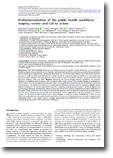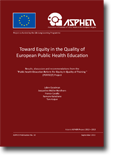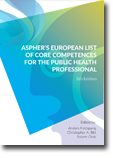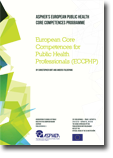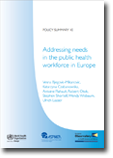• Ensuring greater academic RECOGNITION on the global stage.
• Promoting TRANSFERABILITY of public health education & training.
• Increasing EMPLOYABILITY of public health graduates.
• Attesting the QUALITY of Public Health Workforce training.
![]()
APHEA - Agency for Public Health
Education Accreditaiton
Avenue des Arts 47
1000 Bruxelles, Belgium
Tel: ++32 2 735 0890
email:office@aphea.be
Reviewer Resources
The objective of this part of the website is to provide reviewers and potential reviewers with some of the research and processes behind the various forms of accreditation. The information provided is intended to supplement the physical and online training provided by APHEA. Over the forthcoming years the Agency will conduct, either independently or through partnerships, research projects aimed at addressing needs and ameliorating the sector. The following section includes work both by APHEA, ASPHER and partners which are focussed on the elements included in the accreditation and validation processes. (click on images for links)
The ‘WHO-ASPHER Roadmap to Professionalizing the Public |
|
In 2013, along with ASPHER and other institutional partners, APHEA produced the results of a year long study into European Accreditation which monitored the strengths and weaknesses of programmes as well as the self-expressed needs of schools and programmes of public health. The results were written up in a 200 page book entitled "Toward Equity in the Quality of European Public Health Education." The research was co-funded by the European Commission Life Long Learning program. |
|
ASPHER (The Association of Schools of Public Health in the European Region) has previously developed a list of competences based on European experiences, as expressed by the European schools of public health, by representatives of European ministries of health, and by public health workforce representatives. This publication is designed to be a guide to the level of competences which should be achieved by MPH graduates. It includes competence lists in all the main domains of public health practice, whether this be in service work, teaching, or research. It is the basis for the core curriculum elements of the Curriculum Validation (here). |
|
Along with Master level competences ASPHER and partners also developed a range of competences designed to be an appropriate list of competences for all senior public health professionals. This publication is entitled, "European Core Competencies for Public Health Professionals." |
|
Addressing needs in the public health workforce in Europe. The policy report is produced through a collaboration of ASPHER, the WHO and the European Observatory on Health Systems and Policies. The policy summary examines the needs of the public health workforce by underlining the importance of the content of public health training in Europe. Although APHEA was not directly involved in this work it is placed here due to the significance of the subject. The link is external. |
Further background documentation |
|
Guidelines& Procedures for the Public Health Education European Review (PEER). ASPHER. July 2001. |


